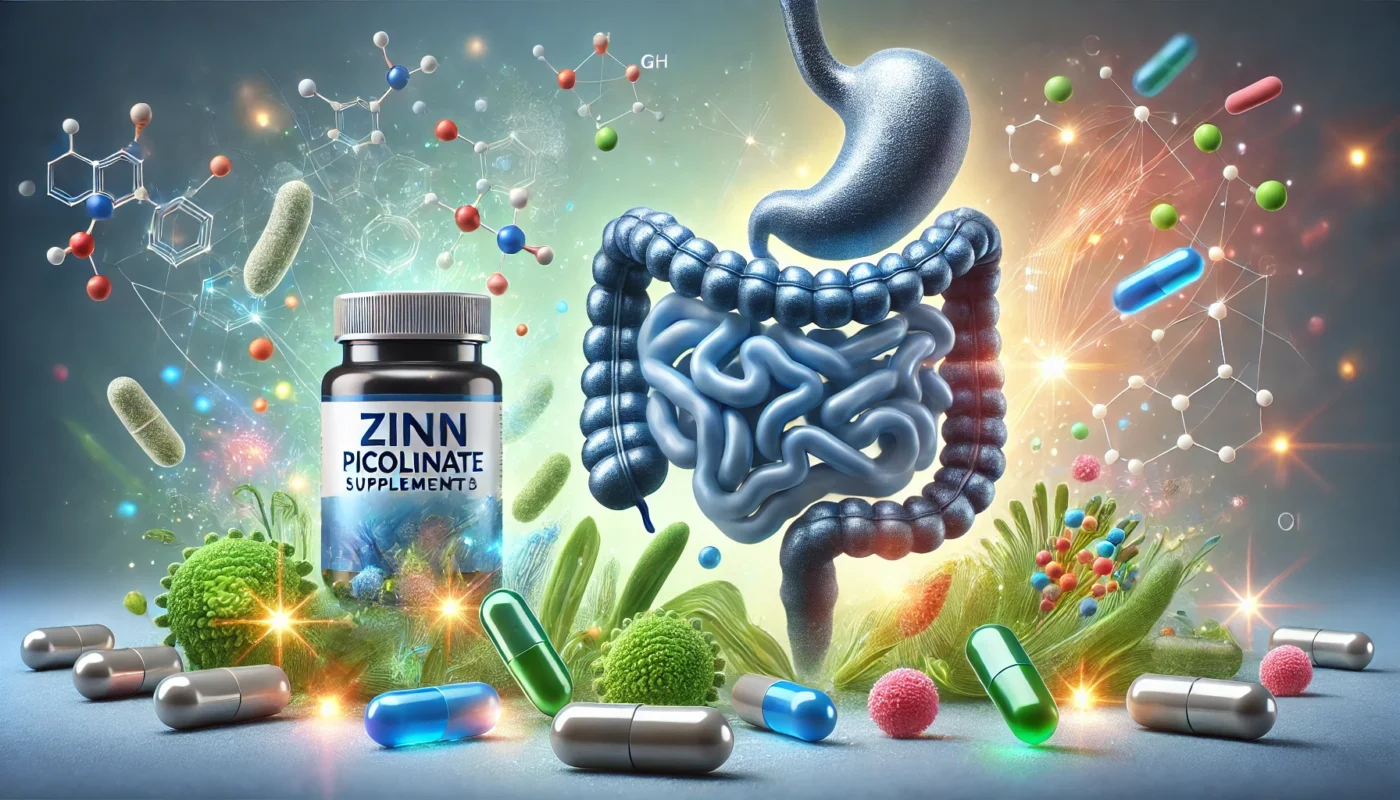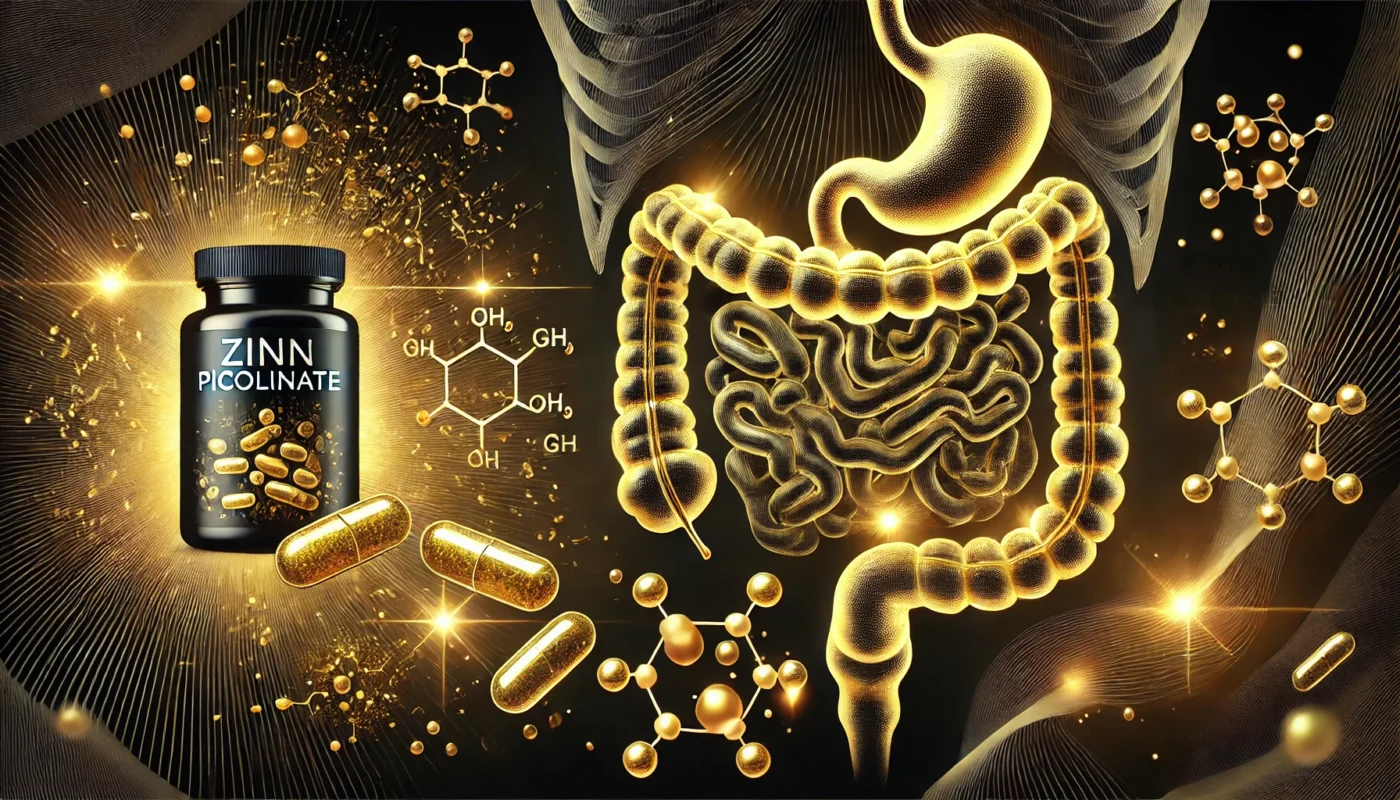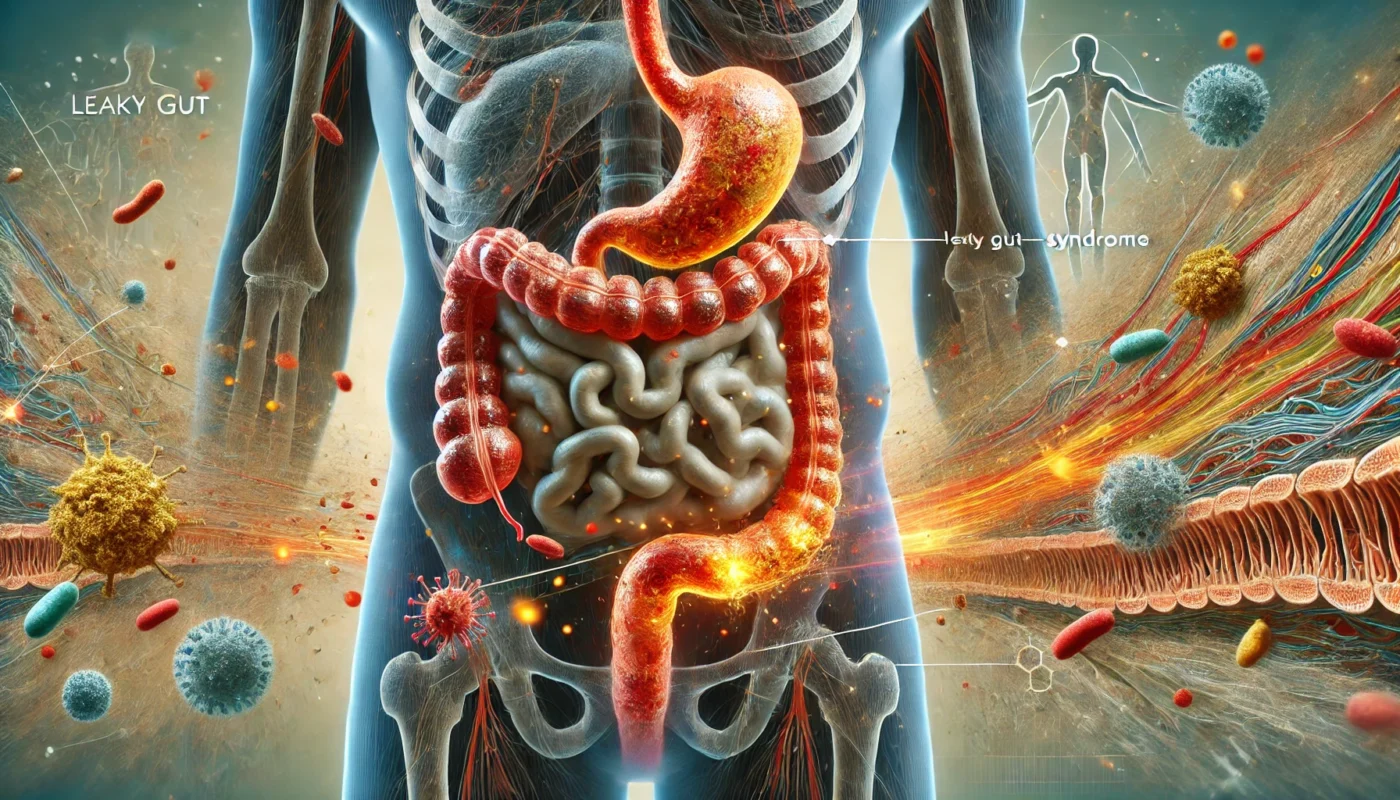Leaky gut syndrome, also known as intestinal permeability, is a condition where the lining of the gastrointestinal (GI) tract becomes compromised, allowing toxins, bacteria, and partially digested food particles to pass through the intestinal wall and enter the bloodstream. This breach in the gut’s natural barrier can lead to widespread inflammation, digestive discomfort, and even systemic health issues, including autoimmune diseases and chronic fatigue.
Zinc picolinate, a highly bioavailable form of zinc, has emerged as a powerful ally in repairing the gut lining and improving digestive health. This article explores the science behind zinc picolinate’s role in addressing leaky gut syndrome, detailing its mechanisms of action and presenting clinical evidence to support its effectiveness.
You May Also Like:
Zinc Picolinate for Liver Detoxification: Clearing Toxins Naturally
The Connection Between Zinc Picolinate and Antiviral Immunity: What Science Reveals
How Zinc Picolinate Helps Repair Leaky Gut Syndrome: The Science You Need to Know is an original (HSLHealing) article.
Understanding Leaky Gut Syndrome
The intestinal lining acts as a selective barrier, allowing nutrients to pass into the bloodstream while keeping harmful substances out. This protective function relies on tight junctions—protein complexes that seal the spaces between intestinal cells.
Key Causes of Leaky Gut Syndrome:
- Chronic Stress: Prolonged stress disrupts gut barrier integrity and increases inflammation.
- Poor Diet: Diets high in sugar, alcohol, and processed foods can weaken the gut lining.
- Medications: Nonsteroidal anti-inflammatory drugs (NSAIDs) and antibiotics can compromise gut health.
- Gut Dysbiosis: Imbalances in the gut microbiome can damage the intestinal barrier.
- Inflammatory Conditions: Disorders like Crohn’s disease and irritable bowel syndrome (IBS) exacerbate gut permeability.
Symptoms of leaky gut syndrome include bloating, food sensitivities, fatigue, skin issues, and brain fog.

Why Zinc Is Critical for Gut Health
Zinc is a trace mineral involved in numerous enzymatic processes that are essential for maintaining a healthy gut. Its key roles include:
- Tight Junction Integrity:
Zinc strengthens the proteins in tight junctions, reducing intestinal permeability. - Cellular Repair and Regeneration:
Zinc supports the repair and renewal of damaged intestinal cells. - Anti-Inflammatory Effects:
Zinc reduces inflammation in the gut lining, preventing further damage. - Immune System Modulation:
Zinc enhances gut-associated lymphoid tissue (GALT), which plays a crucial role in immune defense. - Antioxidant Properties:
Zinc protects intestinal cells from oxidative damage caused by inflammation and free radicals.
What Is Zinc Picolinate?
Zinc picolinate is a chelated form of zinc, where zinc is bound to picolinic acid. This form improves zinc absorption in the gastrointestinal tract, ensuring maximum bioavailability. For individuals dealing with leaky gut syndrome, zinc picolinate offers an efficient and reliable way to deliver zinc to the gut lining where it is needed most.

How Zinc Picolinate Repairs the Gut Lining
1. Strengthening Tight Junctions
Tight junctions are the gatekeepers of the intestinal barrier. Zinc picolinate fortifies these structures, preventing harmful substances from leaking into the bloodstream.
- Study Insight: Research in Gut showed that zinc supplementation reduced intestinal permeability in patients with Crohn’s disease by strengthening tight junctions.
2. Supporting Cellular Regeneration
The gut lining undergoes constant renewal, with cells regenerating approximately every 2–3 days. Zinc is essential for DNA synthesis and cell division, ensuring the rapid repair of damaged gut cells.
- Clinical Evidence: A study in American Journal of Clinical Nutrition found that zinc supplementation accelerated intestinal cell repair in individuals with compromised gut function.
3. Reducing Inflammation in the Gut
Chronic inflammation is both a cause and a consequence of leaky gut syndrome. Zinc picolinate reduces pro-inflammatory cytokines, helping to restore balance in the gut.
- Research Finding: A study in Nutrients demonstrated that zinc supplementation decreased levels of inflammatory markers like tumor necrosis factor-alpha (TNF-α) and interleukin-6 (IL-6) in patients with inflammatory bowel conditions.
4. Modulating Gut Microbiota
Zinc influences the composition of the gut microbiome, promoting the growth of beneficial bacteria that protect the gut lining.
- Study Insight: Research in Journal of Trace Elements in Medicine and Biology showed that zinc supplementation improved microbiome diversity, reducing the overgrowth of harmful bacteria associated with gut inflammation.
5. Enhancing Immune Defense
The gut is home to a significant portion of the body’s immune system. Zinc picolinate strengthens gut-associated lymphoid tissue (GALT), enhancing the immune response and protecting the gut lining.
- Clinical Finding: A study in Immunological Reviews found that zinc improved the function of GALT, reducing gut infections and improving barrier function in individuals with leaky gut syndrome.
6. Combating Oxidative Stress
Oxidative stress damages the gut lining and worsens intestinal permeability. Zinc picolinate’s antioxidant properties neutralize free radicals, protecting gut cells from further harm.
- Research Insight: A study in Free Radical Biology and Medicine highlighted that zinc supplementation reduced oxidative damage in the intestines of individuals with chronic gut inflammation.

Zinc Deficiency and Leaky Gut Syndrome
Zinc deficiency is a common underlying factor in leaky gut syndrome, as insufficient zinc impairs the body’s ability to repair and protect the gut lining.
Symptoms of Zinc Deficiency in Gut Health:
- Increased intestinal permeability
- Poor wound healing in the gut lining
- Frequent infections and inflammation
- Diarrhea or loose stools
Statistics:
- A study in Clinical Nutrition found that 20–25% of individuals with digestive disorders like Crohn’s disease and IBS were zinc-deficient.
- The World Health Organization (WHO) estimates that 17% of the global population is at risk of zinc deficiency, with higher rates in individuals with chronic illnesses.

Dietary Sources of Zinc
While zinc picolinate supplementation is highly effective, incorporating zinc-rich foods into the diet can further support gut health. Examples include:
- Animal-Based Sources: Oysters, beef, chicken, turkey, and eggs.
- Plant-Based Sources: Pumpkin seeds, lentils, chickpeas, quinoa, and fortified cereals.
However, individuals with leaky gut syndrome may struggle to absorb zinc efficiently from food, making supplementation a practical solution.
Recommended Dosage and Safety
The recommended dietary allowance (RDA) for zinc is:
- Adult men: 11 mg/day
- Adult women: 8 mg/day
For addressing leaky gut syndrome, therapeutic doses of zinc picolinate typically range from 15–30 mg/day. Excessive zinc intake (above 40 mg/day) can cause:
- Nausea
- Reduced copper absorption
- Gastrointestinal discomfort
Note: Always consult with a healthcare provider before starting supplementation to determine the appropriate dosage and ensure safety.
Integrating Zinc Picolinate into a Gut Healing Plan
- Take with Meals: Zinc picolinate is best absorbed with food.
- Combine with Other Nutrients: Pair zinc picolinate with L-glutamine, probiotics, and vitamin D for a comprehensive gut healing approach.
- Monitor Progress: Track improvements in digestive health, energy levels, and immune resilience to assess the effectiveness of supplementation.
- Adopt a Gut-Friendly Diet: Focus on anti-inflammatory foods and avoid triggers like processed sugars and alcohol.

Future Research Directions
While current evidence supports zinc picolinate’s role in gut health, future studies could explore:
- Long-term effects of zinc supplementation on chronic gut disorders.
- Synergistic effects of zinc with other gut-healing compounds, such as butyrate or omega-3 fatty acids.
- Zinc’s role in preventing systemic diseases linked to leaky gut syndrome, such as autoimmune conditions.
Conclusion: Zinc Picolinate for Gut Health and Repair
Zinc picolinate offers a scientifically validated, natural solution for addressing leaky gut syndrome and improving digestive health. By strengthening tight junctions, reducing inflammation, and supporting cellular regeneration, zinc picolinate helps repair the gut lining and restores balance to the digestive system.
For individuals seeking to heal their gut and enhance overall wellness, incorporating zinc picolinate into a comprehensive health plan can provide significant benefits. As always, consult with a healthcare provider to tailor supplementation to your specific needs and ensure safe and effective use.

References
- The Roles and Pathogenesis Mechanisms of a Number of Micronutrients in the Prevention and/or Treatment of Chronic Hepatitis, COVID-19 and Type-2 Diabetes Mellitus. Retrieved from: https://pmc.ncbi.nlm.nih.gov/articles/PMC9268086/
- New Insights into the Role of Trace Elements in IBD. Retrieved from: https://pmc.ncbi.nlm.nih.gov/articles/PMC6146599/
- Zinc and Oxidative Stress: Current Mechanisms. Retrieved from: https://pmc.ncbi.nlm.nih.gov/articles/PMC5488004/
- Vitamin and mineral status in patients with inflammatory bowel disease. Retrieved from: https://pubmed.ncbi.nlm.nih.gov/22832510/
- Prevalence of Zinc Deficiency in Inflammatory Bowel Disease: A Systematic Review and Meta-Analysis. Retrieved from: https://pubmed.ncbi.nlm.nih.gov/36235709/
- Zinc and gastrointestinal disease. Retrieved from: https://pmc.ncbi.nlm.nih.gov/articles/PMC4231515/
Important Note: The information contained in this article is for general informational purposes only, and should not be construed as health or medical advice, nor is it intended to diagnose, prevent, treat, or cure any disease or health condition. Before embarking on any diet, fitness regimen, or program of nutritional supplementation, it is advisable to consult your healthcare professional in order to determine its safety and probable efficacy in terms of your individual state of health.
Regarding Nutritional Supplements Or Other Non-Prescription Health Products: If any nutritional supplements or other non-prescription health products are mentioned in the foregoing article, any claims or statements made about them have not been evaluated by the U.S. Food and Drug Administration, and such nutritional supplements or other health products are not intended to diagnose, treat, cure, or prevent any disease.

